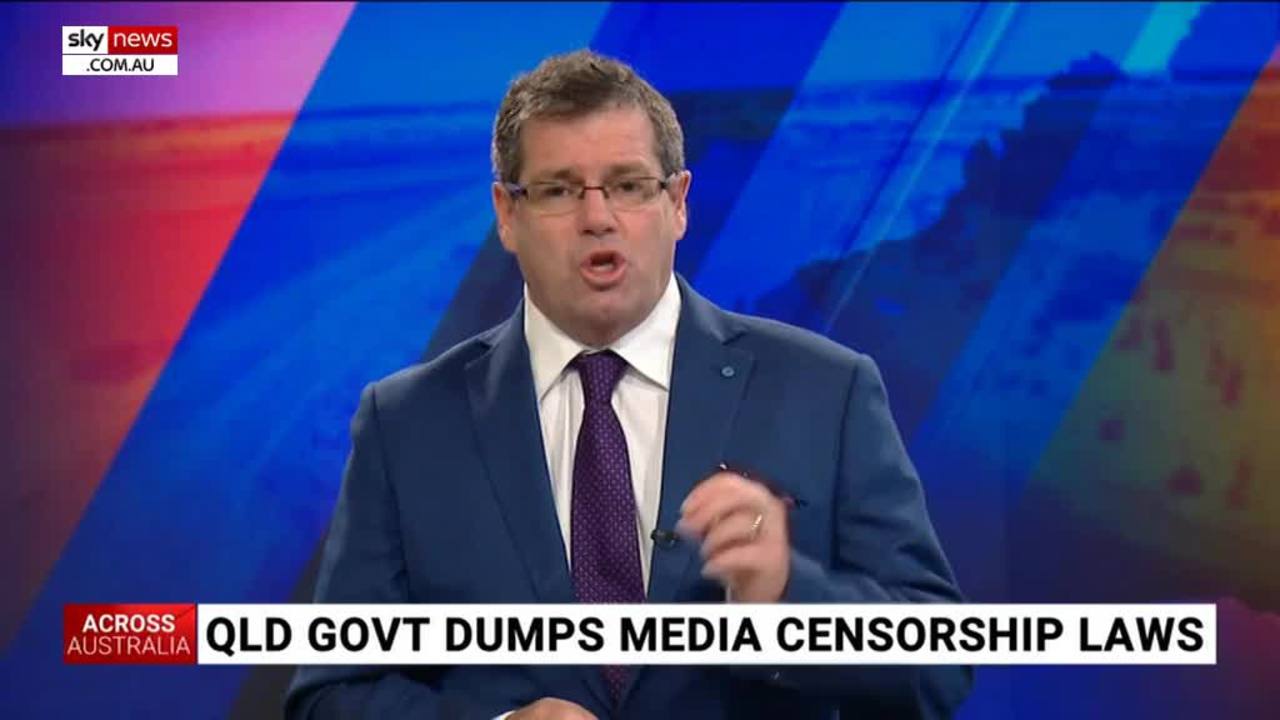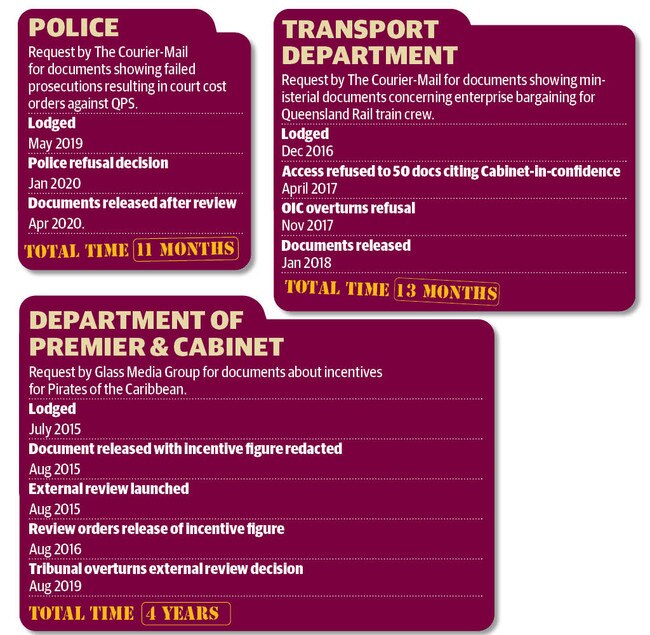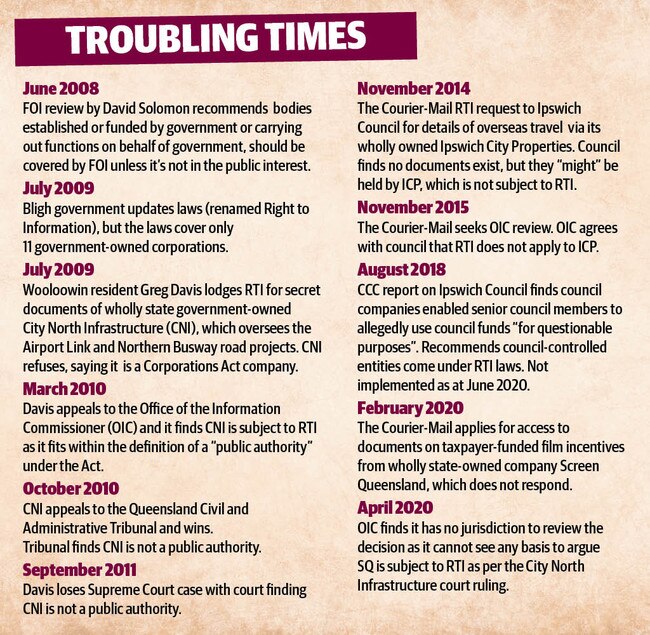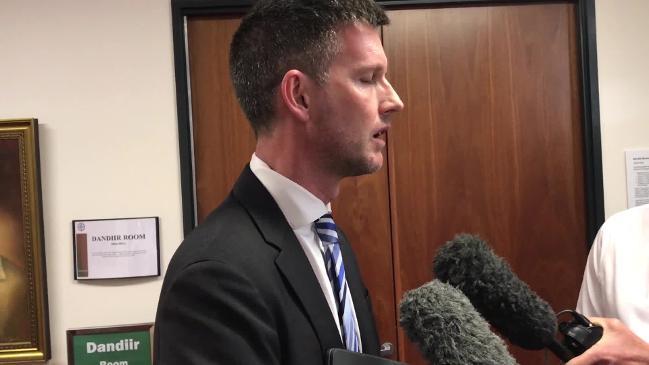How Qld state-owned companies can dodge freedom of information laws
A controversial loophole is protecting dozens of state-owned companies from scrutiny over how they use millions of dollars in taxpayers’ money.

QLD News
Don't miss out on the headlines from QLD News. Followed categories will be added to My News.
Dozens of state-owned companies that control millions of dollars in taxpayers’ money are being protected from public scrutiny because of a controversial loophole declaring them off-limits to freedom of information laws.
The Courier-Mail can reveal corruption officials warned the Queensland Government to close the secrecy loophole two years ago, but it has failed to act.
Freedom of information officers immune from scrutiny themselves
George St Confidential: Real cost of Premier Annastacia Palaszczuk’s propaganda unit
More time wasted on scrapped media gag laws
Queensland Government withdraws controversial legislation
It means public-owned companies can keep secret documents discussing everything from international travel to how they spend their taxpayer dollars.
Some of the largest state and council-owned companies slipping through the cracks include Brisbane Marketing, Screen Queensland, Queensland Treasury Holdings, which holds state assets including port land and airports, and Major Brisbane Festivals, which runs the Brisbane Festival and Riverfire events.
The failure to adopt the Crime and Corruption Commission recommendation comes despite the Labor Government last month justifying its attempt to introduce laws gagging journalists from reporting corruption allegations during election campaigns by saying it was following a CCC recommendation.
The proposed gag law was hastily abandoned amid an outcry the next day.
The Courier-Mail’s Secret State investigation has identified dozens of public-owned companies that operate outside of the glare of RTI laws, which are designed to give Queenslanders access to Government documents to boost accountability and transparency.
Just 11 state-owned companies are currently officially declared Government Owned Corporations and subject to the RTI Act, while only a single entity – the Bar Association of Queensland – has been declared a public authority by regulation, opening it up to RTI.
Other council-controlled companies to escape scrutiny under the RTI act include Brisbane Powerhouse, TradeCoast Land, Museum of Brisbane and the City of Brisbane Investment Corporation.
Gold Coast council-owned companies that sit out-of-reach of the laws are arts hub HOTA Gold Coast and Major Events Gold Coast, which runs the city’s events calendar.

On the Sunshine Coast, council entities Sunshine Coast Events Centre and SunCentral Maroochydore; manager of the Maroochydore City Centre development project, sit outside the RTI Act.
The transparency black hole comes despite Premier Annastacia Palaszczuk promising a new era of accountability and integrity on rising to power in 2015.
That pledge came less than three years before the state’s corruption watchdog recommended in 2018 that the council-controlled entities should be deemed units of public administration, subjecting them to the state’s Right to Information laws and CCC oversight.
The recommendation was one of many arising from the CCC’s Operation Windage probe into Ipswich council.
Among the findings, investigators revealed senior council members were able to use council-owned companies to allegedly spend funds “for questionable purposes”.
Travel expenditure included hiring a private jet to zigzag the US, business class flights, meals at expensive restaurants and memberships to exclusive networking venue, The Brisbane Club.
The CCC findings followed a long battle by The Courier-Mail to unearth documents from Ipswich council-owned companies under RTI.
That ended with a 2014 ruling by the state’s independent RTI umpire, the Office of the Information Commissioner, which found the laws did not apply to the companies.
Council had by then spent $83,521 on lawyers Clayton Utz fending off the newspaper’s RTI requests.

Attorney-General Yvette D’Ath did not specifically respond to questions about why it had not implemented the CCC recommendation to subject council-controlled entities to the state’s RTI laws.
She also did not comment on why public-owned companies such as Screen Queensland and Brisbane Marketing should be excluded under the laws, but said a recent review of the RTI Act had found the “current exclusions generally strike the right balance” when it came to government-owned corporations.
“Accordingly, we are not considering changes to the RTI Act in this respect, as none were recommended.”
The review looked at expanding the laws to cover government entities currently out of reach, but ultimately recommended no change.
It was completed almost a year before the CCC handed down its Operation Windage report.
Local Government Minister Stirling Hinchliffe last week told the newspaper it was not a case of the recommendation not being implemented, but “simply that consultation with the major stakeholders, including local government authorities, is ongoing”.
“... The Palaszczuk Government is committed to the ongoing reform of local government to increase transparency, integrity and accountability,” he said in a statement.

Asked about the recommendation, CCC chairman Alan MacSporran said it had not recently had cause to conduct a broader review of corruption risks across all government-owned entities but “the CCC encourages any mechanism that will enhance the transparency and accountability of how public funds are used.”
RTI lawyer Rebecca Murray, who worked as a State Government RTI officer before launching her own firm, RTI consultants, in 2018, said the situation failed to meet community expectations.
“The public would probably have the view that if you are fully owned by the Government then why on Earth wouldn’t you be subject to the Act?” Ms Murray said.
“We need to make more entities subject to the Act.
“Just because they are subject to the Act doesn’t mean that all of their information is going to be released.
“It just means the opportunity is there for them to be held accountable if necessary and also for them to promote their accountability and transparency to the public.”
Brisbane City Council in 2017 wrote to the Government opposing its council-owned companies coming under the RTI laws.
It also argued for higher charges for applicants.
It has since backflipped on its position, telling The Courier-Mail it no longer objects, so long as there were protections for commercially sensitive information.
The council refused to say why its position had changed.

Documents locked away in Cabinet
Thousands of pages of government papers are being kept hidden each year under impenetrable cabinet secrecy laws.
The cabinet secrecy exemption was used by the State Government 37 times to keep 4841 pages of documents concealed under the state’s version of freedom of information laws, the Right to Information Act, in 2018-19, according to the RTI annual report.
Cabinet – made up of the Premier and 17 ministers – is the peak decision-making body of state government.
Under the RTI Act, documents created for cabinet consideration, or that may reveal a cabinet consideration, are kept secret for 10 years unless published by a decision of the cabinet.
But RTI lawyer Rebecca Murray, a former principal RTI officer for the state government before launching RTI Consultants, said the exemption needed to be overhauled to boost accountability.
One of Ms Murray’s more notable decisions was the now-infamous Mangocube saga involving Transport Minister Mark Bailey’s use of his private mangocube6@yahoo.co.uk account.
Ms Murray wrote to The Australian in response to its RTI request for the emails to inform the newspaper that no records existed because the email account had been deleted.
The deletion of the account triggered a Crime and Corruption Commission probe, but the CCC found no evidence of corrupt conduct and criminal charges for the disposal of public records were not pursued because the email account was able to be recovered.
Ms Murray said exemptions for any documents that would reveal a cabinet consideration or prejudice cabinet confidentiality were too broad and should be reviewed.
Instead, the laws should focus on exemptions for cabinet documents only when their release would prejudice the cabinet process, Ms Murray said.

“I think that would be a much better exemption because it means that the RTI decision-makers would look at the information itself and look at whether or not it would hinder cabinet as to whether it could talk openly and freely about their matters and discuss government.”
Critics of the laws have long complained the cabinet exemption is too broad and out of step with other states.
Ms Murray said RTI officers also needed to more rigorously check that documents had gone before cabinet or were created for cabinet before refusing to release them.
“What we should be doing is asking to see the cabinet submission and then comparing what’s in the documents to see whether that does actually reveal a consideration of cabinet,” she said.
She has also argued for the Information Commissioner to more strongly call out agencies caught doing the wrong thing.
“I think it’s necessary that we do have a deterrent because if there’s nothing to stop people from misusing the Act then they are going to keep doing it.”
Processing delays are also a failing, with some applicants waiting a year or more to receive documents, she said.
The Office of the Information Commissioner is facing mounting demand to settle RTI disputes, receiving 687 review applications in 2018-19 – almost double that of a decade ago – pushing out decision time frames.
Ms Murray, who lives part-time in Washington said one US department received 97,000 RTI applications a year, with each application processed within 24 days.
Originally published as How Qld state-owned companies can dodge freedom of information laws
